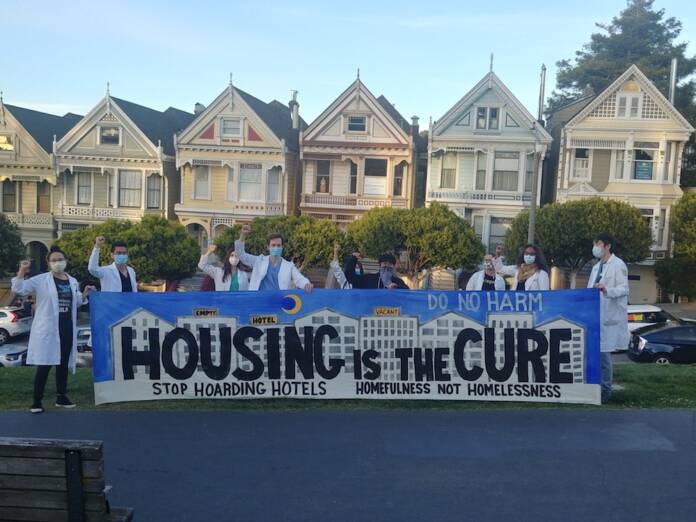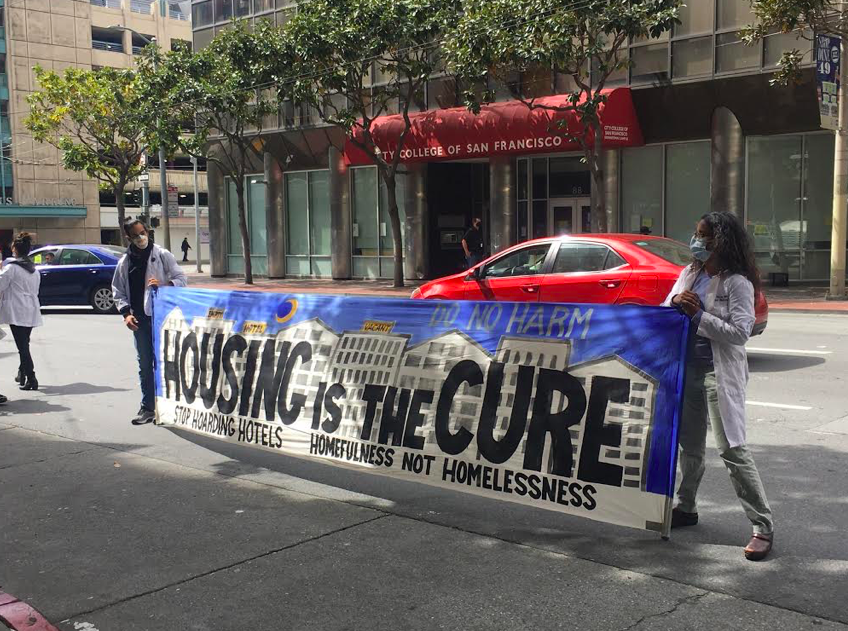
You have to go pretty deep into the Chron’s annual series on homelessness to find anything very useful, but I read it all, and I found it – deep in Question 47 of the “97 answers to your questions.”
Here it is:
Q: Are there examples in other countries of successful methods/processes that have been used to decrease homelessness? Can some of those be applied to the Bay Area?
A: Other Western countries don’t have the same kind of homelessness problem we have here because they have national health systems, living-wage laws, unemployment payments that pay basic bills and national social low-income housing programs, many with laws providing a legal right to a roof.
I think that’s the first time I’ve ever seen the Chron go so far as to say that there are actual solutions to homelessness that involve systemic changes.

So I wonder if the folks who write the editorials for that paper actually read the stories. It seems unlikely that anyone noticed Question 47, because the Sunday editorial, which was promoted as offering “solutions,” says nothing at all. Really: Nothing at all. Read it and tell me if you can figure out what they paper is trying to say.
I have read a lot of terrible editorials in my life. This one has to be among the worst. Theres’s a huge crisis in the city — and the leading daily paper has no answers at all. Nobody is held accountable. The paper offers no programs or policies. It’s as if the Chron is terrified of saying what everyone with any sense knows: That our current economic system, which benefits the very wealthy, isn’t working.
The only “solution” that I could get from the editorial was the idea that cities need to allow the private market to build more housing:
Despite the extraordinary budgets California and its cities devoted to the problem in better times, the housing shortage is the chronic condition spreading homelessness faster than any program has been able to administer a cure.
That’s it. That’s the conclusion. Gee — there’s nothing we can do except hope that private housing development will solve the problem
Except that private housing market is not a solution to homelessness; if anything, it’s a cause.
How come the editorial doesn’t call for “living-wage laws, unemployment payments that pay basic bills and national social low-income housing programs, many with laws providing a legal right to a roof?”
I asked John Diaz, the editorial page editor. As is his practice, he has not responded to me.
Let’s take this a step further. It’s no secret that the rise in homelessness in US cities coincided with the election of Ronald Reagan, massive tax cuts for the rich, massive reductions in social spending, and the emergence of neo-liberalism and supply-side economics. And it’s no secret that the solution to homelessness involves reversing those policy decisions – at every level of government.
That starts with revisiting the tax cuts that have allowed the likes of Jeff Bezos, Bill Gates, and Mark Zuckerberg to collect phenomenal wealth at the expense of the rest of us. They are not suffering because of COVID-19; Bezos is just getting richer and richer.
I don’t expect the Chron every to say that. Fundamentally, it’s a conservative newspaper with a conservative editorial page.
I would like to think that the Democratic Party, with Joe Biden’s promise of a diverse policy-making body that includes Sen. Bernie Sanders and Rep. Alexandra Ocasio-Cortez, would start looking serious at the issue.
So I read the report that the task force has produced. It’s 110 pages long. There are, unless I missed something, exactly two paragraphs that are devoted to the need for major changes in the tax system:
We will work to reform the tax code to be more progressive and equitable, and reduce barriers for families who qualify to benefit from targeted tax breaks. Our tax system has been rigged against the American people by big corporations and their lobbyists, and by Republican politicians who dole out breaks to their biggest donors while leaving families to struggle. A guiding principle across our tax agenda is that the wealthiest Americans can shoulder more of the tax burden, including in particular by making investors pay the same tax rates as workers and bringing an end to expensive and unproductive tax loopholes. Corporate tax rates, which were cut sharply by the 2017 Republican tax cut, must be raised, and “supply-side” or “trickle down” tax cuts must be rejected. Estate taxes should also be raised back to the historical norm.
Building a More Progressive Tax System: Use taxes as a tool to address extreme concentrations of income and wealth inequality. As a means of strengthening tax progressivity and paying for investments in U.S. productivity, increase taxes on the wealthiest Americans by limiting unequal and unproductive tax expenditures. In addition, limit the ability of wealthy taxpayers to defer and avoid taxes on income (especially that relate to financial investments), tax liabilities of ultra- large banks to promote financial stability and fund investments in American productivity, and expand payroll taxes on upper-income taxpayers to fund more generous Social Security benefits.
Some of this is just fine. Raising the (scandalously low) limit on how much income is taxed for social security by even a small amount would keep the system solvent for another century, and allow benefit increases. Raising estate taxes to “the historical norm” is still pretty paltry, but a move in the right direction. The 21087 corporate tax cut should, indeed, be reversed (as should the previous series of corporate tax cuts that started in 1978, under Democrat Jimmy Carter). Changing the capital gains tax rules so that investment income is taxed the same as employment income makes so much sense that Warren Buffett has been talking about it for years.
But why does the policy say “increase taxes on the wealthiest Americans by limiting unequal and unproductive tax expenditures?” Why not “increase taxes on the wealthiest Americans?”
There is no mention of a wealth tax, which may be the only way the economy can survive the COVID crisis. There is no mention of any specific tax rates (remember, between 1945 and 1980, the wealthiest Americans paid as much as 80 percent of their marginal income in taxes).
I suppose most political platforms are vague, and this is a big step forward – the Democrats are at least talking about higher taxes on the rich. Still: At a time like this, I would think the party could do a little better.


